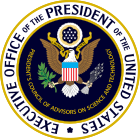Council of Advisors on Science and Technology
 |
|
| Agency overview | |
|---|---|
| Formed | September 30, 2001 |
| Preceding agency | |
| Headquarters | 725 17th Street NW, Washington, D.C. |
| Agency executives |
|
| Parent agency | Office of Science and Technology Policy |
| Website | President's Council of Advisors on Science and Technology |
The United States President's Council of Advisors on Science and Technology (PCAST) is a council, chartered (or re-chartered) in each administration with a broad mandate to advise the President on science and technology. The current PCAST was established by Executive Order on September 30, 2001, by President George W. Bush, and was most recently re-chartered by President Obama's April 21, 2010, Executive Order .
The council follows a tradition of presidential advisory panels focused on science and technology that dates back to President Franklin D. Roosevelt's Science Advisory Board, continued by President Harry Truman. Renamed the President's Science Advisory Committee (PSAC) by Dwight Eisenhower, it was disbanded by President Richard Nixon.
Reagan science advisor Jay Keyworth re-established a smaller "White House Science Council" It reported, however, to him, not directly to the President. Renamed PCAST, and reporting directly to the President, a new council was chartered by President George H. W. Bush in 1990, enabling the President to receive advice directly from the private and academic sectors on technology, scientific research priorities, and mathematics and science education.
The President's Council of Advisors on Science and Technology mission is to provide advice to the President and the Executive Office of the President. PCAST makes policy recommendations in areas such as understanding of science, technology, and innovation. PCAST is administered by the Office of Science and Technology Policy (OSTP).
Recent PCAST reports have addressed antibiotic resistance,education technology (with a focus on MOOCs),cybersecurity, climate change,networking and information technology, and agricultural preparedness, among many others.
...
Wikipedia
